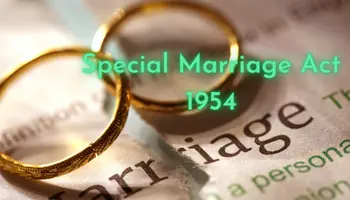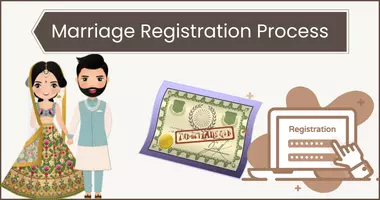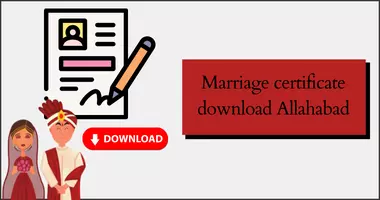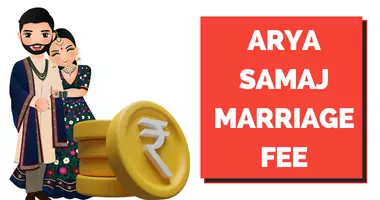The Special Marriage Act, 1954 is a law in India that allows two people to get married, regardless of their religion, caste, or faith. If you’re planning a court marriage or an interfaith marriage, this is the law that applies to you. Special Marriage Act registration is a civil process. It’s simple, legal, and doesn’t require any rituals. But yes—there’s a proper Special Marriage Act procedure you need to follow, and this blog covers it all step by step. Whether you’re marrying by choice, across religions, or just want a legal process without ceremonies, understanding the Special Marriage Act is important.
What Is the Special Marriage Act?
The Special Marriage Act is a law made in 1954. It allows any two people to get married without converting their religion. You don’t need a pandit, priest, or religious ritual. This is a civil marriage law that works for all Indian citizens, including those living abroad.
The Special Marriage Act 1954 replaced an older law from 1872. Earlier, people had to leave their religion to marry under that law. But now, that’s not needed. This law respects your personal beliefs and focuses only on consent and legal documents.
Applicability of the Special Marriage Act of 1954
Individuals of diverse faiths, such as Muslims, Hindus, Parsis, Sikhs, Jains or Christians, can marry under this Act.
The Act applies to interreligious, inter-caste marriages, love marriages and intra-faith marriages and also provides an option to register marriages carried out following the couple’s personal laws.
Eligibility to marry under the Special Marriage Act 1954
Before getting married under the Special Marriage Act 1954, both partners must meet specific legal conditions. These rules are important to ensure the marriage is valid in the eyes of the law.
Below are the eligibility criteria under the Special Marriage Act in simple terms:
1. Neither Partner Should Be Already Married
- At the time of marriage, both the bride and groom must be unmarried, divorced, or widowed.
- The Act follows monogamy, which means you cannot have a living spouse at the time of this marriage.
- If either person is already married under any law and the marriage hasn’t been legally dissolved, they cannot marry again under this Act.
2. Mental Fitness of Both Parties
The Special Marriage Act 1954 also checks if both individuals are mentally capable of entering into a marriage.
Neither the bride nor the groom should:
- Be incapable of giving valid consent due to unsoundness of mind
- Suffer from any mental disorder that makes them unfit for marriage or for having children
- Experience repeated episodes of insanity or mental illness that would affect married life
This ensures both individuals can understand and agree to the responsibilities of marriage.
3. Minimum Age Requirement
- The minimum age to marry under the Special Marriage Act is:
- 21 years for the groom
- 18 years for the bride
Both must provide official documents for age proof, like a birth certificate or school leaving certificate.
4. Prohibited Degrees of Relationship
The Special Marriage Act 1954 does not allow marriage between close blood relatives.
- You cannot marry someone who falls under the “degrees of prohibited relationship” listed in the First Schedule of the Act.
This includes close relatives like:- Siblings
- Uncle–niece
- Aunt–nephew
- First cousins (in most cases)
If you’re closely related by blood, you’re generally not allowed to marry under the Special Marriage Act—even if your religion or culture allows it.
5. Free Consent Is Mandatory
- Both people must willingly agree to marry.
- Forced marriages are not valid under this Act.
- The couple must be able to understand what marriage means and give full consent.
6. No Religious Ceremonies Required
- The Special Marriage Act procedure is purely legal and does not need religious rituals.
- Marriage is solemnized at the Marriage Registrar’s Office, not in a temple, church, mosque, or gurudwara.
- The couple simply needs to sign documents and make a verbal declaration in front of the registrar and three witnesses.
Where Does the Special Marriage Act Apply
The Special Marriage Act is for:
- People from different religions or castes.
- Same-religion couples who want a court marriage.
- Indian citizens living abroad (they can apply through Indian embassies).
- Couples who want to register their already solemnized marriage under this law.
So whether you’re Hindu, Muslim, Christian, Sikh, Jain, or atheist—this law gives everyone equal marriage rights.
Step-by-Step Special Marriage Act Procedure
Let’s look at the complete Special Marriage Act procedure:
1. Give Notice of Intended Marriage
First, go to the local marriage registrar’s office. One of you must have lived in that area for at least 30 days.
You need to fill a form called “Notice of Intended Marriage.” It includes basic details like name, age, and address. This starts the legal process.
2. Public Notice and Objection Period
After you file the notice, the officer puts it on display for 30 days. This is to give others a chance to raise any legal objections.
- If no objection is raised during this time, the couple can go ahead with the marriage.
- If there is an objection, the Marriage Officer will investigate it. If found valid, the marriage may be delayed or denied. You may then appeal to the District Court.
3. Marriage Ceremony
Once the 30-day period is complete, the couple can solemnize the marriage at:
- The Marriage Officer’s office, or
- Any other place near the office (with additional charges)
During the marriage:
- The bride and groom must say in front of the Marriage Officer and three adult witnesses: “I, (Name), take you, (Name), to be my lawful wife (or husband).”
- This must be said in a language that both understand.
No religious rituals are needed.
4. Signing the Marriage Declaration
After the vows:
- The bride, groom and three witnesses must sign a declaration in the presence of the Marriage Officer.
- The Officer also signs the document to confirm the marriage.
5. Special Marriage Act Registration and Certificate
Once the ceremony is completed:
- The Marriage Officer enters the marriage details in the Marriage Certificate Book.
- An official Marriage Certificate is issued.
This certificate is:- Legal proof of your marriage
- Accepted for visa, passport, and other government purposes
Note: Time Limit to Get Married After Notice
- Once the 30-day notice period is over, you must get married within 3 months.
- If the marriage doesn’t happen in that time (or if an appeal is pending and settled), you’ll need to submit a fresh notice.
- The old notice becomes invalid after 3 months
Documents Required for Special Marriage Act Registration
To complete the Special Marriage Act registration, you’ll need:
- Aadhaar card, PAN card, or passport for ID
- Birth certificate or school certificate for age proof
- Address proof (utility bill, voter ID, etc.)
- Passport-sized photographs
- Affidavit stating your marital status and nationality
- Divorce decree (if applicable)
- Death certificate (if widowed)
The three witnesses also need to bring ID and address proof.
Objections Under Special Marriage Act 1954: What Happens and What to Do
During the 30-day notice period, anyone can object to the marriage based on legal grounds. The Special Marriage Act 1954 allows this to ensure all marriages are valid.
If an objection is raised:
- The officer will investigate within 30 days.
- If the objection is false or invalid, the marriage will proceed.
- If the officer accepts the objection, you can appeal in the district court.
Divorce Under Special Marriage Act
If things don’t work out, the Special Marriage Act also covers divorce. You can get a divorce through:
- Mutual consent
- Cruelty
- Desertion
- Adultery
- Mental illness
- No cohabitation for at least one year
The law also allows for judicial separation and annulment
Benefits of the Special Marriage Act
Here’s why many couples choose the Special Marriage Act 1954:
- No need to convert religion
- Equal legal rights for both partners
- Safe and simple court marriage
- Valid across all states and countries
- Protects the rights of children born from the marriage
It’s a fair law that gives you freedom to choose your partner.
Important Things to Remember
- If you belong to a Hindu joint family, marrying under this Act will remove your coparcenary rights. That means you might lose your share in ancestral property.
- If the marriage is not done within 3 months of notice, you’ll have to apply again.
- Always choose honest and reliable witnesses.
Final Thoughts: Why the Special Marriage Act Matters
The Special Marriage Act 1954 is a powerful law that gives couples the freedom to marry without religious or caste barriers. It helps many couples who face social or family issues. It also gives an option to those who simply prefer a court marriage.
The process is clear. The law is fair. And the marriage is legally strong.
If you are planning an interfaith or inter-caste wedding—or just want a simple legal marriage—this law is for you. Understanding the Special Marriage Act procedure will make your journey smoother.
For more help, visit your local marriage registrar or check your state government website. You can also apply for marriage registration with the help of Itzeazy
FAQs
What was the purpose of the Special Marriage Act, 1954?
The Special Marriage Act, 1954 was made to give people a way to marry without religious rituals. It allows couples of different religions, castes, or backgrounds to get married through a civil (court) marriage.
The main purpose is to protect personal freedom and promote secular, legal marriage in India—without needing conversion or approval from religious laws.
Who can marry under the Special Marriage Act?
Any two people—regardless of their religion or caste—can marry under the Special Marriage Act 1954 if they meet the following conditions:
- Groom is at least 21 years old; bride is 18 or older
- Both are mentally fit and capable of consent
- Neither is already married
- They are not closely related (as per the law’s list)
- One partner has lived in the district for 30 days or more before applying
Even NRIs (Non-Resident Indians) can use this law through Indian embassies
What is the difference between Hindu marriage and special marriage?
Hindu Marriage:
- Follows Hindu customs and rituals like saat phere
- Only for Hindus, Sikhs, Buddhists, and Jains
- Governed by the Hindu Marriage Act, 1955
- No public notice required before marriage
- Divorce and maintenance follow religious personal laws
Special Marriage Act 1954:
- Done through a civil court marriage – no rituals needed
- Open to all religions, castes, and even interfaith couples
- Governed by the Special Marriage Act, 1954
- Requires a 30-day public notice before solemnisation
- Divorce and other rights handled under secular laws
What is the Special Marriage Act, 1954 for divorce?
The Special Marriage Act 1954 also includes rules for divorce, judicial separation, and annulment. If the marriage doesn’t work, either partner can apply for divorce under this Act.
Grounds for divorce under Special Marriage Act include:
- Mutual consent
- Cruelty (mental or physical)
- Desertion (for 2+ years)
- Adultery
- Mental disorder
- No cohabitation after court order for 1 year
The process is legal and handled by the family or district court. The Act also ensures equal rights for both husband and wife in property, maintenance, and child custody matters.





Leave a Reply